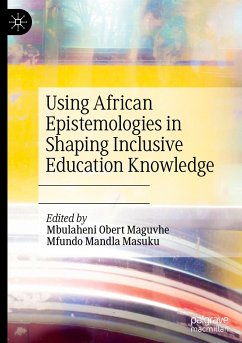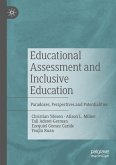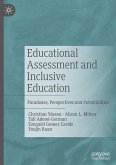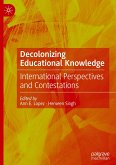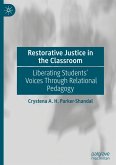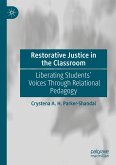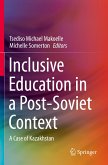Using African Epistemologies in Shaping Inclusive Education Knowledge
Herausgegeben:Maguvhe, Mbulaheni Obert; Masuku, Mfundo Mandla
Using African Epistemologies in Shaping Inclusive Education Knowledge
Herausgegeben:Maguvhe, Mbulaheni Obert; Masuku, Mfundo Mandla
- Gebundenes Buch
- Merkliste
- Auf die Merkliste
- Bewerten Bewerten
- Teilen
- Produkt teilen
- Produkterinnerung
- Produkterinnerung
This book thus explores the role of African epistemologies in addressing the myriad challenges posed by the inclusive education system in Africa and other contexts. In recent years, the shift from special education to inclusive education has had a significant impact on the provision of education and the education system as a whole in Africa. The impact has been felt in all institutions of learning from low to high, public and private, government, and across departments of education. Inclusive education, if shaped correctly by using African epistemologies, would empower learners to attain the…mehr
Andere Kunden interessierten sich auch für
![Educational Assessment and Inclusive Education Educational Assessment and Inclusive Education]() Christian YdesenEducational Assessment and Inclusive Education108,99 €
Christian YdesenEducational Assessment and Inclusive Education108,99 €![Educational Assessment and Inclusive Education Educational Assessment and Inclusive Education]() Christian YdesenEducational Assessment and Inclusive Education108,99 €
Christian YdesenEducational Assessment and Inclusive Education108,99 €![Decolonizing Educational Knowledge Decolonizing Educational Knowledge]() Decolonizing Educational Knowledge116,99 €
Decolonizing Educational Knowledge116,99 €![Cosmopolitanism and Inclusive Education through 21st-Century Disney Films Cosmopolitanism and Inclusive Education through 21st-Century Disney Films]() Ana López-FuentesCosmopolitanism and Inclusive Education through 21st-Century Disney Films79,95 €
Ana López-FuentesCosmopolitanism and Inclusive Education through 21st-Century Disney Films79,95 €![Restorative Justice in the Classroom Restorative Justice in the Classroom]() Crystena A. H. Parker-ShandalRestorative Justice in the Classroom108,99 €
Crystena A. H. Parker-ShandalRestorative Justice in the Classroom108,99 €![Restorative Justice in the Classroom Restorative Justice in the Classroom]() Crystena A. H. Parker-ShandalRestorative Justice in the Classroom108,99 €
Crystena A. H. Parker-ShandalRestorative Justice in the Classroom108,99 €![Inclusive Education in a Post-Soviet Context Inclusive Education in a Post-Soviet Context]() Inclusive Education in a Post-Soviet Context106,99 €
Inclusive Education in a Post-Soviet Context106,99 €-
-
-
This book thus explores the role of African epistemologies in addressing the myriad challenges posed by the inclusive education system in Africa and other contexts.
In recent years, the shift from special education to inclusive education has had a significant impact on the provision of education and the education system as a whole in Africa. The impact has been felt in all institutions of learning from low to high, public and private, government, and across departments of education. Inclusive education, if shaped correctly by using African epistemologies, would empower learners to attain the relevant skills, knowledge, values, and attitudes for their own intellectual growth and personal development.
In recent years, the shift from special education to inclusive education has had a significant impact on the provision of education and the education system as a whole in Africa. The impact has been felt in all institutions of learning from low to high, public and private, government, and across departments of education. Inclusive education, if shaped correctly by using African epistemologies, would empower learners to attain the relevant skills, knowledge, values, and attitudes for their own intellectual growth and personal development.
Produktdetails
- Produktdetails
- Verlag: Palgrave Macmillan / Springer Nature Switzerland / Springer, Berlin
- Artikelnr. des Verlages: 978-3-031-31114-7
- 2023
- Seitenzahl: 512
- Erscheinungstermin: 14. Juli 2023
- Englisch
- Abmessung: 216mm x 153mm x 32mm
- Gewicht: 768g
- ISBN-13: 9783031311147
- ISBN-10: 3031311140
- Artikelnr.: 67630788
- Herstellerkennzeichnung Die Herstellerinformationen sind derzeit nicht verfügbar.
- Verlag: Palgrave Macmillan / Springer Nature Switzerland / Springer, Berlin
- Artikelnr. des Verlages: 978-3-031-31114-7
- 2023
- Seitenzahl: 512
- Erscheinungstermin: 14. Juli 2023
- Englisch
- Abmessung: 216mm x 153mm x 32mm
- Gewicht: 768g
- ISBN-13: 9783031311147
- ISBN-10: 3031311140
- Artikelnr.: 67630788
- Herstellerkennzeichnung Die Herstellerinformationen sind derzeit nicht verfügbar.
Mbulaheni Obert Maguvhe is Professor of Inclusive Education at the University of South Africa. He has published a number of peer reviewed articles and books in his field and is an active member of several national and international Disability organisations. Mfundo Mandla Masuku is Senior Lecturer in the School of Development Studies at University of Mpumalanga, South Africa. He has published a number of papers on food security, Local Economic Development, governance and the scholarship of teaching and learning.
Chapter 1. Conceptualizing Inclusive Education Through the Lens of African Indigenous Education.- Chapter 2. An Afro-centric Approach to Inclusive Education.- Chapter 3. An African Perspective on Inclusive Education Content, Conversations and Policy Debates: The case of Lesotho.- Chapter 4. Rationale for Africanising Inclusive Education.- Chapter 5. Inclusive Education: Challenging Barriers, claiming Human Rights and Social Justice.- Chapter 6. Afrocentricity to Create Opportunities to Eliminate Hegemony in African Pedagogies.- Chapter 7. African Traditional Knowledge Systems to Manage Inclusive Education.- Chapter 8. Building a Student-Centred Inclusive Education System: An African Agenda for Real Action and Real Change.- Chapter 9. The Role and Place of African Indigenous Knowledge Systems in the Analyses of Inclusive Education.- Chapter 10. An African Perspective on Inclusivity, Equity, Equality, Accessibility and Empowerment.- Chapter 11. Unique African Challenges in the Provisionof Quality Inclusive Education in School Education and Training.- Chapter 12. Innovative Inclusive Education Schools for Persons Experiencing Barriers in Learning.- Chapter 13. Impact of Resources on the Delivery of Inclusive Education in the African Context.- Chapter 14. African Building Blocks for Inclusive Education Programme, Curriculum Design, Development and Delivery.- Chapter 15. Using African Philosophies in the Alignment of Inclusive Education Programmes with National Priorities.- Chapter 16. Post-School Education and Training: Building an Expanded, Effective, Efficient and Inclusive Post-School System.- Chapter 17. Evaluating the Idea of Western Epistemologies as Universal Norm to Explain Inclusive Education.- Chapter 18. Evaluating Interventions to Decolonise Inclusive Education.- Chapter 19. Embracing the Impact and Importance of Inclusive Education for All Learners.- Chapter 20. Trends and Practices for Shaping Inclusive Education in the African Context.- Chapter 21. Consequences of Marginalization of African Values in Exploring Inclusive Education.- Chapter 22. Supporting Students Experiencing Barriers to Learning in Inclusive Education Settings: A Critical Requirement for Educational Success.- Chapter 23. Teachers' Influence on Adherence to Inclusive Education in the African Context.- Chapter 24. International Protocols and Treaties on Inclusive Education.- Chapter 25. Diversity and its Implications for Teaching and Learning in Higher Educational Institutions.- Chapter 26. Using African Philosophies in the Alignment of Inclusive Education: Programmes with Sustainable Development Goals.
Chapter 1. Conceptualizing Inclusive Education Through the Lens of African Indigenous Education.- Chapter 2. An Afro-centric Approach to Inclusive Education.- Chapter 3. An African Perspective on Inclusive Education Content, Conversations and Policy Debates: The case of Lesotho.- Chapter 4. Rationale for Africanising Inclusive Education.- Chapter 5. Inclusive Education: Challenging Barriers, claiming Human Rights and Social Justice.- Chapter 6. Afrocentricity to Create Opportunities to Eliminate Hegemony in African Pedagogies.- Chapter 7. African Traditional Knowledge Systems to Manage Inclusive Education.- Chapter 8. Building a Student-Centred Inclusive Education System: An African Agenda for Real Action and Real Change.- Chapter 9. The Role and Place of African Indigenous Knowledge Systems in the Analyses of Inclusive Education.- Chapter 10. An African Perspective on Inclusivity, Equity, Equality, Accessibility and Empowerment.- Chapter 11. Unique African Challenges in the Provisionof Quality Inclusive Education in School Education and Training.- Chapter 12. Innovative Inclusive Education Schools for Persons Experiencing Barriers in Learning.- Chapter 13. Impact of Resources on the Delivery of Inclusive Education in the African Context.- Chapter 14. African Building Blocks for Inclusive Education Programme, Curriculum Design, Development and Delivery.- Chapter 15. Using African Philosophies in the Alignment of Inclusive Education Programmes with National Priorities.- Chapter 16. Post-School Education and Training: Building an Expanded, Effective, Efficient and Inclusive Post-School System.- Chapter 17. Evaluating the Idea of Western Epistemologies as Universal Norm to Explain Inclusive Education.- Chapter 18. Evaluating Interventions to Decolonise Inclusive Education.- Chapter 19. Embracing the Impact and Importance of Inclusive Education for All Learners.- Chapter 20. Trends and Practices for Shaping Inclusive Education in the African Context.- Chapter 21. Consequences of Marginalization of African Values in Exploring Inclusive Education.- Chapter 22. Supporting Students Experiencing Barriers to Learning in Inclusive Education Settings: A Critical Requirement for Educational Success.- Chapter 23. Teachers' Influence on Adherence to Inclusive Education in the African Context.- Chapter 24. International Protocols and Treaties on Inclusive Education.- Chapter 25. Diversity and its Implications for Teaching and Learning in Higher Educational Institutions.- Chapter 26. Using African Philosophies in the Alignment of Inclusive Education: Programmes with Sustainable Development Goals.

